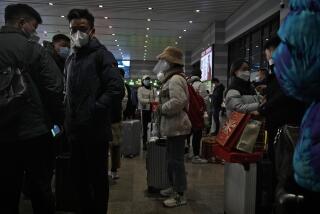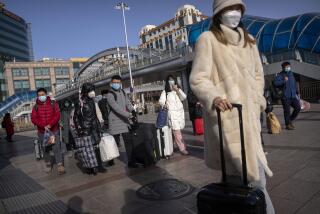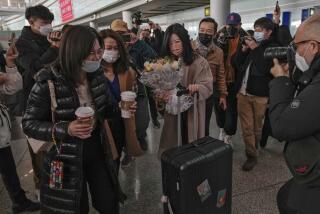SARS Cases in Beijing Level Off, Government Says
- Share via
BEIJING -- New cases of SARS in the Chinese capital have leveled off, officials said Friday, but residents are taking no chances, mostly spending the May Day holiday at home.
“Since April 21, the number of SARS patients in Beijing has entered the peak period,” Liang Wannian, deputy director general of the Beijing Municipal Health Bureau, told a news conference.
For the last 10 days, Beijing has reported up to 152 cases of severe acute respiratory syndrome, or SARS, a day, making it the world’s hardest-hit city. Liang noted that SARS cases in Hong Kong and neighboring Guangdong province had leveled off for 16 to 20 days before declining.
“My personal judgment is the present high plateau of the number of cases in Beijing will continue for a period of time,” he said. “Overall the situation in Beijing is stable, and the upward trend has been effectively checked.”
Today, Beijing reported 96 new cases of SARS and nine new deaths. With 3,799 infections and 181 fatalities, according to official statistics, China now has more SARS cases than the rest of the world combined. Worldwide, SARS has infected 5,865 people and killed 391, while 2,563 patients have recovered.
Health authorities blamed the severity of Beijing’s outbreak on the several weeks during March and April in which the disease spread unreported and unchecked. Chinese officials insist they will not make such mistakes again and that China is now fully mobilized for a war on SARS.
World Health Organization experts said they see a decisive phase approaching.
“The next few months will prove crucial in the attempt to contain SARS worldwide, which now greatly depends on whether the disease can be controlled in China,” the WHO said in a statement on its Web site.
In Hong Kong, authorities Friday reported 11 new confirmed SARS cases in the 24 hours through Friday noon and eight additional deaths. The figures bring the death toll for the territory to 170 out of a total of 1,611 patients who have contracted the pneumonia-like virus since the outbreak began this year.
Friday’s eight victims ranged in age from 75 to 93 and four had a history of chronic disease at the time they were hit by the virus.
In a related development, a senior Hong Kong health official disputed reports that a dozen former SARS patients had suffered relapses of the disease days after being declared cured and released from the hospital.
Tse Lai Yin, who heads the Department of Health’s Disease Prevention and Control Division, told colleagues in an internal department e-mail that only one of the 12 former SARS patients readmitted to the hospital was being closely monitored for symptoms of a possible relapse.
Reports this week that some SARS victims had apparently been struck down a second time raised public concerns that the virus might somehow have developed the ability to revive itself after a period of remission.
In the e-mail, which was read to The Times by Health Department spokeswoman Debbie Ho, Tse reported that half the patients already had been redischarged after routine monitoring, while three others remained under observation after being admitted with light fevers.
Ho said the contents of the e-mail indicated that the symptoms of these patients “did not look like a SARS relapse.”
Of the remaining three, Tse stated that two were readmitted with ailments unrelated to the virus.
To prevent the spread of the disease, China reduced its weeklong holiday to five days, and discouraged residents from traveling. Beijing has seen little festive spirit during this International Labor Day, when Chinese leaders traditionally honor national “model workers” atop the rostrum at Tiananmen Square, and urban Chinese take package tours around the country.
A few hardy souls who ventured outside enjoyed the bright sunshine and lack of traffic.
“I’m worried by SARS, but not so bad that I won’t go to work,” said a property manager surnamed Liu as he bicycled at a leisurely pace along Beijing’s deserted second ring road, which on any other afternoon rush hour would be bumper to bumper with traffic. “Besides, I have to disinfect my buildings every day,” he said.
In front of the Hospital of the Beijing University of Chinese Medicine, several security guards meandered near the gate, enforcing the quarantine. SARS patients there had been transferred to other hospitals, they said. Inside, behind a police cordon, doctors and nurses wearing white jackets and facemasks played badminton in the hospital courtyard.
“We’re not allowed to take any time off for the holiday, and even if we were, we couldn’t go home,” said a young guard from central Henan province. Despite a ban on out-of-town laborers returning to the provinces, a small trickle of migrants continued to leave the city by train.
Despite official orders to remain on their sealed-off campuses, many college students fearful of SARS have also left Beijing. At Friday’s news conference Beijing government spokesman Cai Fuchao disputed media characterizations of the students’ departure as “mass flight,” adding that only 39 of the capital’s 670,000 college students had contracted SARS.
Officials said that they would wait until next week to decide whether 1.7 million secondary school students could resume classes on Thursday, as scheduled, or extend the moratorium that was imposed on April 23.
Hotels, restaurants and bars remained empty and authorities have ordered all entertainment venues closed.
A study by the China Center for Economic Research at Beijing University estimated that the epidemic would cost Beijing $365 million in lost tourism revenues over the May Day holiday. Beijing’s economy grew at a rate of 10.2% last year, but the study predicted that it would likely grind to a standstill or even contract this year because of SARS.
Special correspondent Kuhn reported from Beijing and staff writer Marshall reported from Hong Kong.
More to Read
Sign up for Essential California
The most important California stories and recommendations in your inbox every morning.
You may occasionally receive promotional content from the Los Angeles Times.













